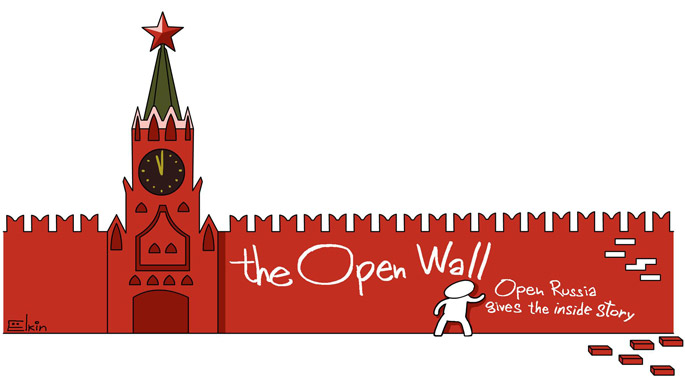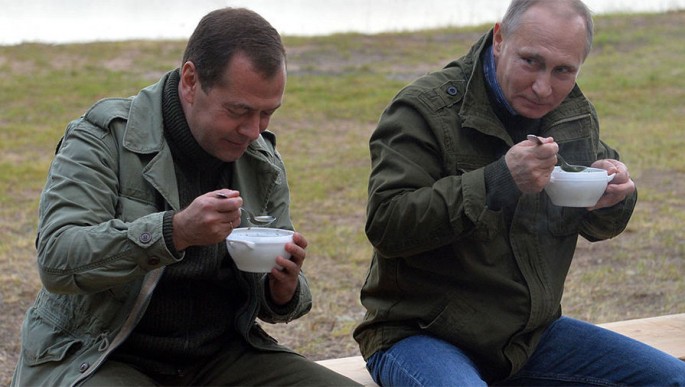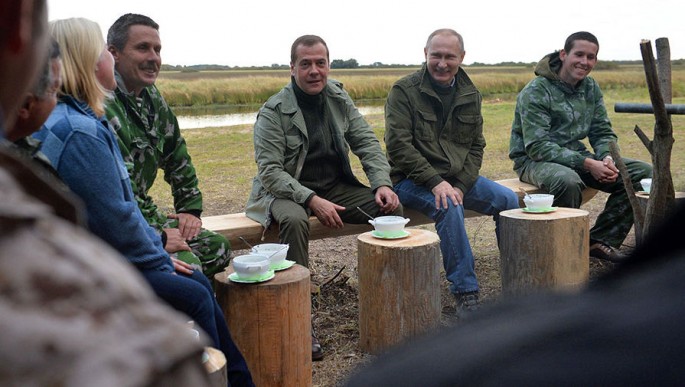Something fishy

Something fishy
“Fish on Friday” they say; and we just couldn’t resist this fisherman’s tale about Vlad and Dima’s latest fishing trip.

Photo: Aleksei Druzhinin/Press Service President of the Russian Federation/TASS
A few days ago, President Vladimir Putin and Prime Minister Dmitry Medvedev went on what their respective press services described as an “impromptu weekend away together.” Well, that’s something friends sometimes do. And colleagues as well. Nothing unusual about that – in the West you’d call it a team-building exercise. So off they went. Their getaway destination? Novgorod Region. They travelled to Lipno Island on Lake Ilmen, where they paid a visit to a late-thirteenth-century church – the first stone church, in fact, to be built in the country after the Mongol invasion of the 1230s and 40s. Who would have guessed that they had such an interest in old buildings, when there aren’t any left in Moscow.
According to the official version of events, Vlad and Dima then decided to take a stroll around the island. And – entirely by chance, of course – they soon happened upon a group of fishermen who treated them to a lunch of ukha (pike-perch soup).
Thanks to the efforts of Vlad and Dima’s press services, we can savour the visual details of the meeting; only perhaps not quite as they intended. Ordinary Novgorod fishermen – dressed in brand-new orange overalls? Meeting the president and prime minister on a remote island in the middle of nowhere? We needn’t point out that real fishermen would never don such garb – to say nothing of the fact that an island about to receive a presidential visit would normally be fully “cleaned out” by the Federal Protection Service; you wouldn’t see so much as a mackerel within a ten-kilometre radius. But here’s the glorious clincher. The ukha is served on a series of identical-looking, equally-spaced tree stumps, which give every impression of having been “planted” there (pun intended) five minutes previously.
As you can imagine, the Runet has been having a field day, pointing out the inconsistencies, the fabrications, the sheer absurdity of it all. But, while we usually love to show you Westerners how our fellow Russians are not quite as subservient as you might think – that we can still laugh at our politicians – that isn’t what interests us the most about this pre-election publicity stunt. No, on this occasion, we thought you might like to hear our take on a phrase that seems to sum up this shameful charade.

Photo: Aleksei Druzhinin/Press Service President of the Russian Federation/TASS
We Russians are ever keen to enumerate the things that we, as a nation, have given to the world. In addition to ballet, cosmonauts, Tolstoy, Dostoevsky and Chekhov, Russian loanwords in European languages (mostly in English) feature prominently in any version of this list. For some reason, there’s even a section about them in (if memory serves) the Year 9 Russian Language school textbook, which proudly catalogues words such as “vodka,” “balalaika” and “sputnik.”
Never mind that the standard English term isn’t sputnik but satellite; never mind that conversations about Russian folk string instruments are likely to be rather thin on the ground in … well, anywhere, actually. What really matters is that the schoolkids reading the textbook overflow with patriotic pride – our mighty Motherland! … our noble tongue! … vodka!
It’s remarkable, however, that, whether by accident or by design, the compilers of the textbook have neglected to add to the loanword list a term that genuinely has enriched the English language, furnishing its speakers with a vivid and powerful concept. The term in question is Potemkin village. As well as earning a place in the OED and Merriam-Webster, it is also frequently used (believe it or not) in the US legal system.
The story of the Potemkin villages is hardly obscure, but here’s a little reminder. When, in the penultimate decade of the eighteenth century, Empress Catherine the Great embarked on her country-spanning journey (with foreign ambassadors in tow) to inspect the newly acquired (!) territory of Crimea, His Serene Highness Prince Grigory Potemkin-Tauride decided to pull the wool over the eyes of both Empress and foreigners.
Their route lay through the barren steppe of southern Ukraine, which Potemkin hastily spruced up with theatre-like sets depicting happy peasant settlements. Legend has it these constructions were collapsible and portable, and that, taking advantage of the slow pace of Catherine’s procession to the south, Potemkin managed to dismantle his villages after the Empress departed one locale, and rebuild them before she arrived in another, wowing her again and again with visions of pastoral paradise.
Over two centuries have passed, but the term Potemkin village isn’t about to disappear anytime soon – except in Russia that is. Perhaps it fails to inspire any degree of pride because it’s all too Russian, because it encapsulates all too successfully a crucial feature of the national character – our desire to conceal the sordidness of reality behind a fancy façade. To hide it not only from foreigners or from the authorities, but from ourselves.
Yes, of course, Vlad and Dima’s fishing trip was choreographed from beginning to end, but couldn’t they have staged it as a professional production, not like the local am-dram society? To make us believe that it was true? True, we don’t like them, but neither do we like the country being held up to ridicule. Because that fishing trip merely confimed what so many of us know – that the whole country is now just one big Potemkin village.



